When sharing one of my pages on FB, I want to display something different. Problem is, I prefer not to use the og: elements, but to recognize FB user-agent.
What is it? I can't find it.
When sharing one of my pages on FB, I want to display something different. Problem is, I prefer not to use the og: elements, but to recognize FB user-agent.
What is it? I can't find it.
For list of user-agent strings, look up here. The most used, as of September 2015, are facebookexternalhit/* and Facebot. As you haven't stated what language you're trying to recognize the user-agent in, I can't tell you more information. If you do want to recognize Facebook bot in PHP, use
if (
strpos($_SERVER["HTTP_USER_AGENT"], "facebookexternalhit/") !== false ||
strpos($_SERVER["HTTP_USER_AGENT"], "Facebot") !== false
) {
// it is probably Facebook's bot
}
else {
// that is not Facebook
}
UPDATE: Facebook has added Facebot to list of their possible user-agent strings, so I've updated my code to reflect the change. Also, code is now more predictible to possible future changes.
"Facebook's user-agent string is facebookexternalhit/1.1 (+http://www.facebook.com/externalhit_uatext.php)..."
Hi
Small, yet important, correction -> Facebook external hit uses 2 different user agents:
facebookexternalhit/1.0 (+http://www.facebook.com/externalhit_uatext.php)
facebookexternalhit/1.1 (+http://www.facebook.com/externalhit_uatext.php)
Setting you fitler to 1.1 only may cause filtering issues with 1.0 version.
For more information about Facebook Bot (and other bots) please refer to Botopedia.org - a Comunity-Sourced bot directory, powered by Incapsula.
Besides user-agent data, the directory also offers an IP verification option, allowing you to cross-verify an IP/User-Agent, thus helping to prevent impersonation attempts.
Here are the Facebook crawlers User Agent:
FacebookExternalHit/1.1
FacebookExternalHit/1.0
or
facebookexternalhit/1.0 (+http://www.facebook.com/externalhit_uatext.php)
facebookexternalhit/1.1 (+http://www.facebook.com/externalhit_uatext.php)
Note that the version numbers might change. So use a regular expression to find the crawler name and then display your content.
Update:
You can use this code in PHP to check for Facebook User Agent
if(preg_match('/^FacebookExternalHit\/.*?/i',$agent)){
print "Facebook User-Agent";
// process here for Facebook
}
Here is ASP.NET code. You can use this function to check if the userAgent is Facebook's useragent.
public static bool IsFacebook(string userAgent)
{
userAgent = userAgent.ToLower();
return userAgent.Contains("facebookexternalhit");
}
Note:
Why would you need to do that? When you share a link to your site on Facebook, facebook crawls it and parses it to get some data to display the thumbnail, title and some content from your page, but it would link back to your site.
Also, I think this would lead to cloaking of the site, i.e. displaying different data to user and the crawlers. Cloaking is not considered a good practice and may search engines and site take note of it.
Update: Facebook also added a new useragent as of May 28th, 2014
Facebot
You can read more about the facebook crawler on https://developers.facebook.com/docs/sharing/webmasters/crawler
Please do note that sometimes the agent is visionutils/0.2 . You should check for it too.
Facebook User-Agents are:
FacebookExternalHit/1.1 FacebookExternalHit/1.0 facebookexternalhit/1.0 (+http://www.facebook.com/externalhit_uatext.php) facebookexternalhit/1.1 (+http://www.facebook.com/externalhit_uatext.php) facebookexternalhit/1.0 (+https://www.facebook.com/externalhit_uatext.php) facebookexternalhit/1.1 (+https://www.facebook.com/externalhit_uatext.php)
I'm using the code below to detect FB User-Agent in PHP and it works as intended:
$agent = $_SERVER['HTTP_USER_AGENT'];
if(stristr($agent, 'FacebookExternalHit')){
//Facebook User-Agent
}else{
//Other User-Agent
}
Short solution is to check pattern, and not to load all the mess to user each time
<?php
# Facebook optimized stuff
if(strstr($_SERVER['HTTP_USER_AGENT'],'facebookexternalhit')) {
$buffer.='<link rel="image_src" href="images/site_thumbnail.png" />';
}
?>
In the perspective of user-agent modifications on FB side, it is maybe safer to use a regex like that :
<?php
if (preg_match("/facebook|facebot/i", $_SERVER['HTTP_USER_AGENT'])){
do_something();
}
?>
You can find more information about Facebook crawler on their doc: https://developers.facebook.com/docs/sharing/webmasters/crawler
Firstly you should not use in_array as you will need to have the full user agent and not just a subset, thus will quickly break with changes (i.e. version 1.2 from facebook will not work if you follow the current preferred answer). It is also slower to iterate through an array rather than use a regex pattern.
As no doubt you will want to look for more bot's later so I've given the example below with 2 bot names split in a pattern with the pipe | symbol. the /i at the end makes it case insensitive.
Also you should not use $_SERVER['HTTP_USER_AGENT']; but you should filter it first incase someone has been a little nasty things exist in there.
$pattern = '/(FacebookExternalHit|GoogleBot)/i';
$agent = filter_input(INPUT_SERVER, 'HTTP_USER_AGENT', FILTER_SANITIZE_ENCODED);
if(preg_match($pattern,$agent)){
echo "found one of the patters";
}
A bit safer and faster code.
And if you want to block facebook bot from accessing your website (assuming you're using Apache) add this to your .htaccess file:
<Limit GET POST>
BrowserMatchNoCase "Feedfetcher-Google" feedfetcher
BrowserMatchNoCase "facebookexternalhit" facebook
order deny,allow
deny from env=feedfetcher
deny from env=facebook
</Limit>
It also blocks google's feedfetcher that also can be used for cheap DDoSing.
You already have the answer for Facebook above, but one way to get any user agent is to place a script on your site that will mail you when there is a visit to it. For example, create this file on your domain at, say, https://example.com/user-agent.php :
<?php
mail('you@youremail.com', 'User Agent', $_SERVER['HTTP_USER_AGENT']);
Then, visit Facebook, and type the link to the script there, and hit space bar. You don't actually have to share anything, just typing the link in and a space will cause Facebook to fetch a preview. You should then get an email with Facebook's user agent.

Another generic approach in PHP
$agent = $_SERVER['HTTP_USER_AGENT'];
$agent = trim($agent);
$agent = strtolower($agent);
if (
strpos($agent,'facebookexternalhit/1.1')===0
|| strpos($agent,'facebookexternalhit/1.0')===0
){
//probably facebook
}else{
//probably not facebook
}